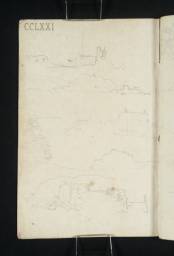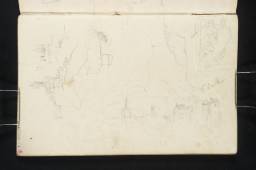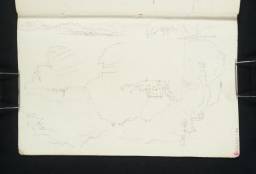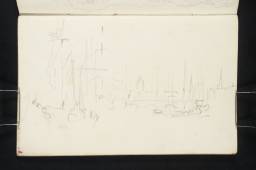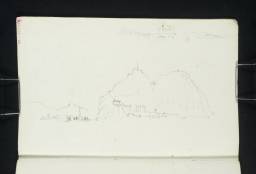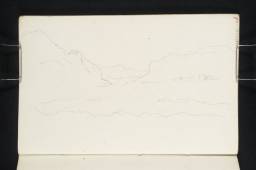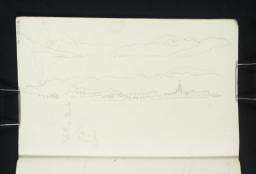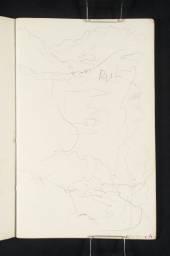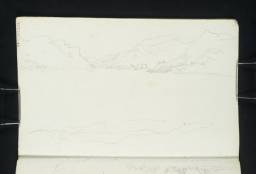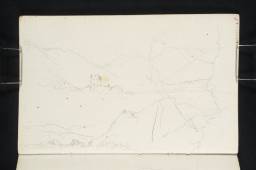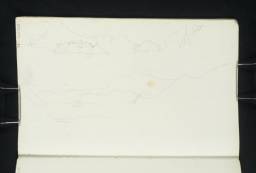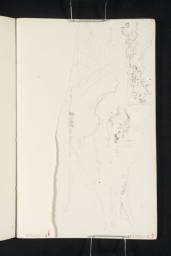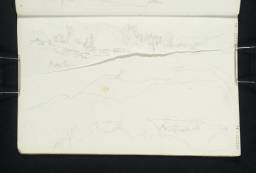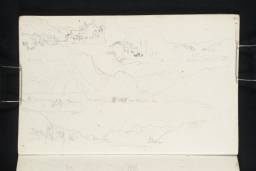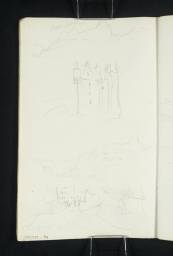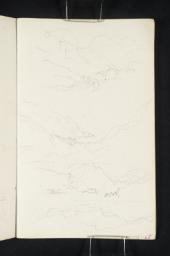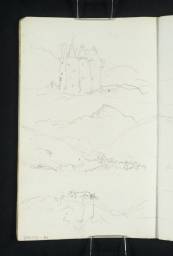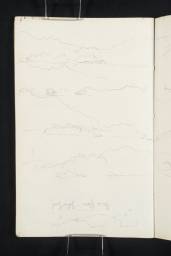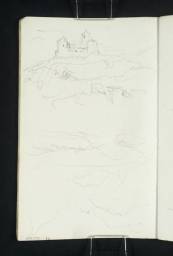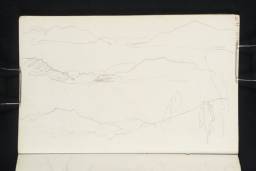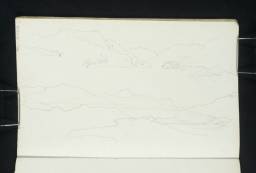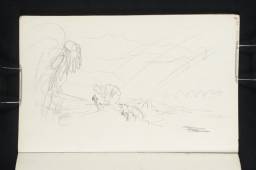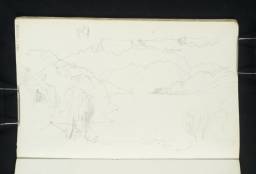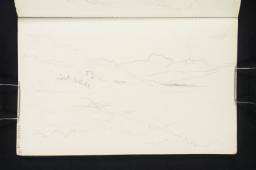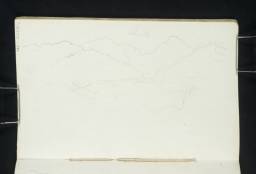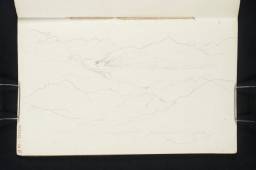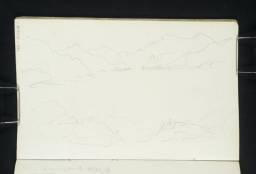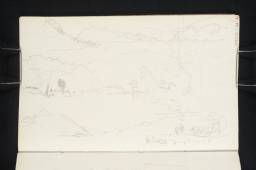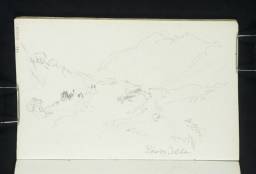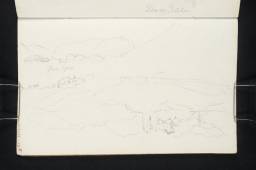Turner Bequest CCLXXI
Small sketchbook bound in blue wove paper-covered boards, bound with string and slightly damaged at the spine. Stamped in black at the top right of the front cover ‘CCLXXI’, and blindstamped with the Turner Bequest stamp at the lower-centre of the back cover.
24 sheets of off-white double-faced laid writing paper made from three folded sheets watermarked with an image of Britannia and countermarked ‘W Turner | 1828’. Made by William Turner at Chafford Mill, Fordcombe, Kent.1
Approximate paper size 158 x 101 mm.
Numbered ‘No.377’ as part of the Turner Schedule in 1854 and endorsed by the executors of the Turner Bequest on the inside back cover (D41132).
24 sheets of off-white double-faced laid writing paper made from three folded sheets watermarked with an image of Britannia and countermarked ‘W Turner | 1828’. Made by William Turner at Chafford Mill, Fordcombe, Kent.1
Approximate paper size 158 x 101 mm.
Numbered ‘No.377’ as part of the Turner Schedule in 1854 and endorsed by the executors of the Turner Bequest on the inside back cover (D41132).
Accepted by the nation as part of the Turner Bequest 1856
References
The Loch Long sketchbook is one of the twelve books that Turner used on his 1831 tour of Scotland undertaken to collect subjects to be engraved as illustrations to a new edition of Sir Walter Scott’s Poetical Works (see Tour of Scotland for Scott’s Poetical Works 1831 Tour Introduction for further details). The name derives from Turner’s inscription on folio 15 verso (D26648). However, it is strange that Finberg should have chosen ‘Loch Long’ for the title rather than ‘Loch Goil’, which is also inscribed on the page and depicted more frequently in the book, or any of the other subjects in the sketchbook.
The book was used for perhaps a week or less at the start of Turner’s journey to the west of Scotland. Having completed his journey north, visiting the Cumbrian Lakes, the border country and Edinburgh, Turner set off on 16 August 1831 from South Queensferry near Edinburgh for a journey west along the River Forth to Stirling.2 On deck Turner opened the Loch Long sketchbook for the first time at what is now considered the back of the book, and began a sequence of sketches recording his journey along the estuary and river: folios 20 verso–24 verso and the inside back cover (D26658–D26666, D41132) (roughly reverse order).3
Upon reaching Stirling Turner put away the present book and took up the Stirling and the West sketchbook (Tate D26436–D26618; D41082–D41083 complete; Turner Bequest CCLXX) which he later used concurrently with this sketchbook. He picked it up again at Bowling on the Clyde (folios 6 verso–7; D26630–D26631) during his approach to Dumbarton where he drew the Rock and Castle (see inside front cover; D41131). These sketches later contributed towards a watercolour which was engraved for Scott’s Prose Works: Dumbarton Castle and River Leven circa 1833 (whereabouts unknown).4
From the Clyde Turner joined other tourists in several steamboat tours. The first took him up Loch Lomond (folio 17 verso; D26652) and then to Lochs Arklet (folio 12; D26641), Katrine (folio 11 verso; D26640) and Achray. In addition to these few sketches Turner made many more in the Stirling and the West sketchbook.
The second tour was a round trip halfway up Loch Long (folio 15 verso; D26648), and then up the length of Loch Goil past Carrick Castle (folio 4 verso; D26626) to Lochgoilhead (folio 10 recto; D26637), where passengers boarded a coach to St Catherine’s on Loch Fyne, crossing by ferry to Inverarary. In addition to sketches in the Stirling and West book, Turner made several sketches here of Dunderave Castle (folio 7 verso; D26632) on the shore of Loch Fyne. He returned by a different route which brought him through Glen Croe (folio 8; D26633) to the head of Loch Long, from where he made his final sketches in this book (folios 7 verso, 8 verso and 9; D26632, D26634, D26635).5
During this tour Turner seems to have saved the sketchbooks with the better quality paper, such as Stirling and the West, for his more carefully executed and detailed sketches, using this thin sketchbook of laid paper for more cursory work. The majority of sketches, however, while fairly rapidly executed in an economic, note-taking style are still carefully drawn in a clear and legible manner, usually two or three sketches to the page.
The sketchbook is intact and in fairly good condition apart from slight foxing on many of the pages and damage to the paper spine. The only damaged page (folio 6 verso; D26630) was evidently torn before Turner drew on it as he fitted his drawing to the available space.
This part of the journey is discussed in an article by David Wallace-Hadrill and Janet Carolan (Wallace-Hadrill and Carolan 1990, pp.15–16). It should be noted that while this part of the journey has been confirmed by those authors and the present writer, Wallace-Hadrill and Carolan subsequently revised later sections of the itinerary as set out in the 1990 article in their unpublished notes. A revised itinerary of the whole tour is set out in the Tour of Scotland for Scott’s Poetical Works 1831 Tour Introduction.
How to cite
Thomas Ardill, ‘Loch Long Sketchbook 1831’, sketchbook, July 2010, in David Blayney Brown (ed.), J.M.W. Turner: Sketchbooks, Drawings and Watercolours, Tate Research Publication, December 2012, https://www

